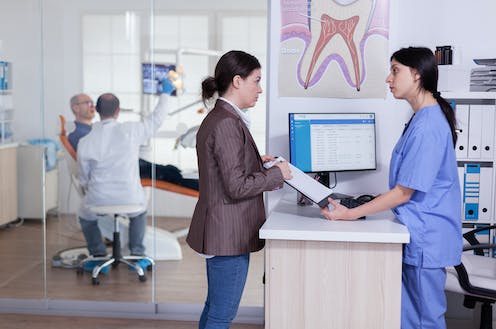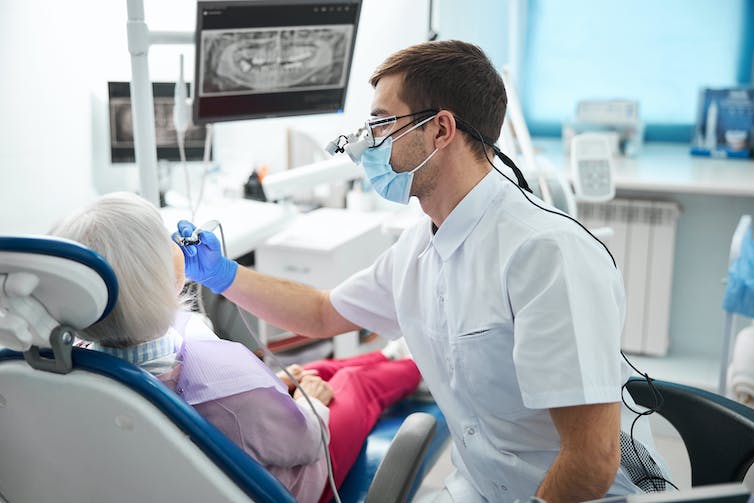
Almost 90% of NHS dental practices in the UK are no longer accepting new adult patients, according to a report by the BBC. Only one in five practices are willing to accept children as new patients.
Reports also show that between 2019 and 2021, only around 36% of UK adults were able to get an appointment with an NHS dentist. Those fortunate enough to get an appointment often have to wait months for routine dental care. The lack of access to emergency care is even worse, with many patients taking matters into their own hands and resorting to DIY dentistry.
While these figures are shocking, they come as no surprise to many within the profession. For years, the British Dental Association has warned the government that NHS dentistry was hanging by a thread. And without urgent action, the situation will only continue to deteriorate.
NHS funding
Dentistry has always been on the fringes of the NHS. Part of this is because dental services are commissioned and delivered differently compared to other parts of the NHS. Approximately 90% of UK dentistry is provided by high street dental practices which are independently owned and are simply contracted to deliver NHS services. Staff are not part of the NHS and practices operate as small businesses. For many, dental care is not free at the point of delivery, and since 1951, patients have had to pay towards the cost of their treatment.
Since 2006, funding for NHS dental services has been restricted – with the current level only sufficient to provide care for 50% of the population. Reports have also shown that between 2014 and 2019, NHS dentistry actually saw a 4% reduction in funding while overall NHS funding during the same period increased by an average of 1.4% per year. During the same period, patient dental charges increased by 9% in real terms, which equated to a 17% increase in patient contributions. In a nutshell, government funding for NHS dentistry has decreased while patients are being asked to pay more to prop up an ailing service.
At the same time, the costs of delivering dentistry are rapidly rising, making it increasingly difficult for NHS practices to survive. Delivering high quality healthcare in a safe environment provided by highly skilled professionals is expensive, and costs continue to spiral.
Analysis by the British Dental Association indicates that dental inflation is running at over 11% with the cost of wages, materials, consumables, laboratory items and utility bills all rising dramatically. With NHS funding being reduced in real terms, dental practices are being forced to look to the private sector to maintain financial viability. This has been a longstanding issue for NHS practices, but has become more acute as a consequence of COVID, Brexit and UK inflation.
Contracts and recruitment
But funding is only one part of the problem.
In 2006, a radical new dental contract was introduced with ambitious plans to modernise dentistry in England and Wales for the benefit of patients and the dental profession. It has been viewed as an abject failure by many, although it has enabled the Treasury to cap dental funding and control NHS spending on dentistry.

Svitlana Hulko/ Shutterstock
This 2006 contract also saw the introduction of a novel method of measuring performance based on a crude points system (known as Units of Dental Activity or UDAs) which has proved highly unpopular. In short, dentists are given a certain number of points for performing different procedures (such as a filling) on a patient. Practices have an annual target of UDAs to achieve, which need to be delivered in order to retain their NHS funding. However, UDAs often don’t add up – with dentists being given the same number of UDAs for performing a small filling as they would if they did multiple fillings, root canals and gum treatment on the same patient.
This target-based system rewards quantity of UDAs over quality of treatment, fails to promote preventative dentistry and impedes access for new patients. As a consequence, the contract does little to promote improvements in oral health and actively disincentivises the treatment of patients with the greatest needs.
Despite widespread criticism, the contract is still in place 16 years later – and patients continue to suffer as a consequence. Recent proposals from NHS England, aimed at addressing some of the failings, are seen as too little too late. Dentists want to care for their patients, rather than chase UDA targets in a desperate bid to retain their NHS funding. This is a key driver in many leaving the NHS.
The government’s failure to invest in NHS dentistry has also undermined the profession’s confidence, with many seeing little future in the NHS. There have been too many false promises and dentists are increasingly looking to the private sector in order to protect their patients, their staff and their businesses.
Unfortunately, many young graduates see no future in the NHS and aim to work in the private sector from an early stage of their career. The situation has been compounded by Brexit, COVID-19, reduced numbers of UK graduates and increased part-time working.
NHS dentistry does not and cannot deliver a “a comprehensive service, available to all” under the present funding. There is unlikely to be any additional investment in NHS dentistry now as we head into a recession, especially since dentistry is considered low priority.
With current services at breaking point, we need urgent, decisive and radical action to safeguard the future oral health of the Nation. Investment needs to focus on prevention and provision of emergency care. The limited NHS dental resources need to be targeted responsibly at the most vulnerable in society. Prioritisation must be given to those with the greatest need, which will place a greater onus on those who can afford to pay.
Tough decisions need to be made, which will not be universally popular. But without it, the current crisis will only deepen and those with the greatest need will inevitably suffer the most.
![]()
Ian Mills does not work for, consult, own shares in or receive funding from any company or organisation that would benefit from this article, and has disclosed no relevant affiliations beyond their academic appointment.
























